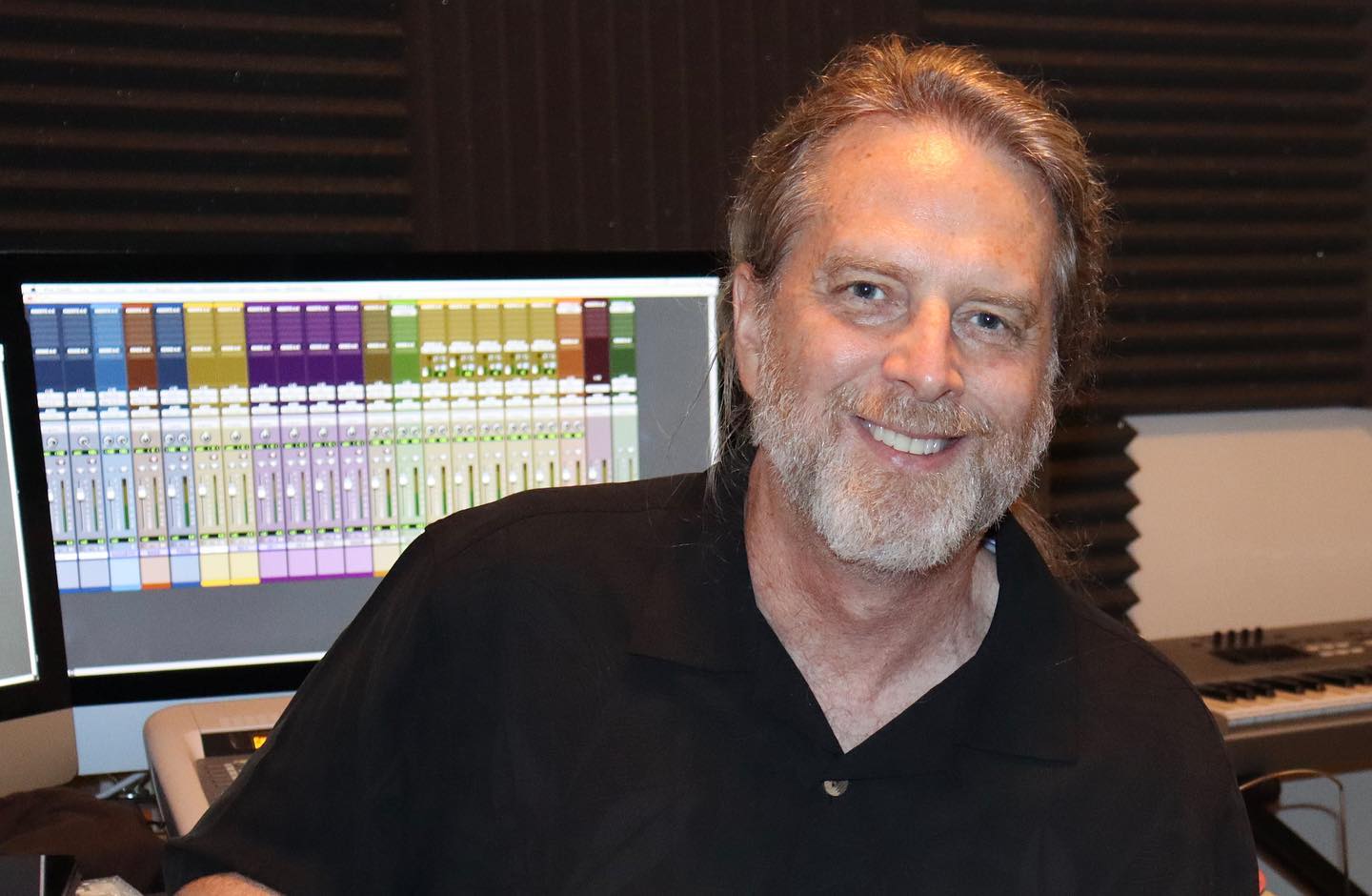Art in the Ordinary
Flynn Makes Coffee Art in his Sink
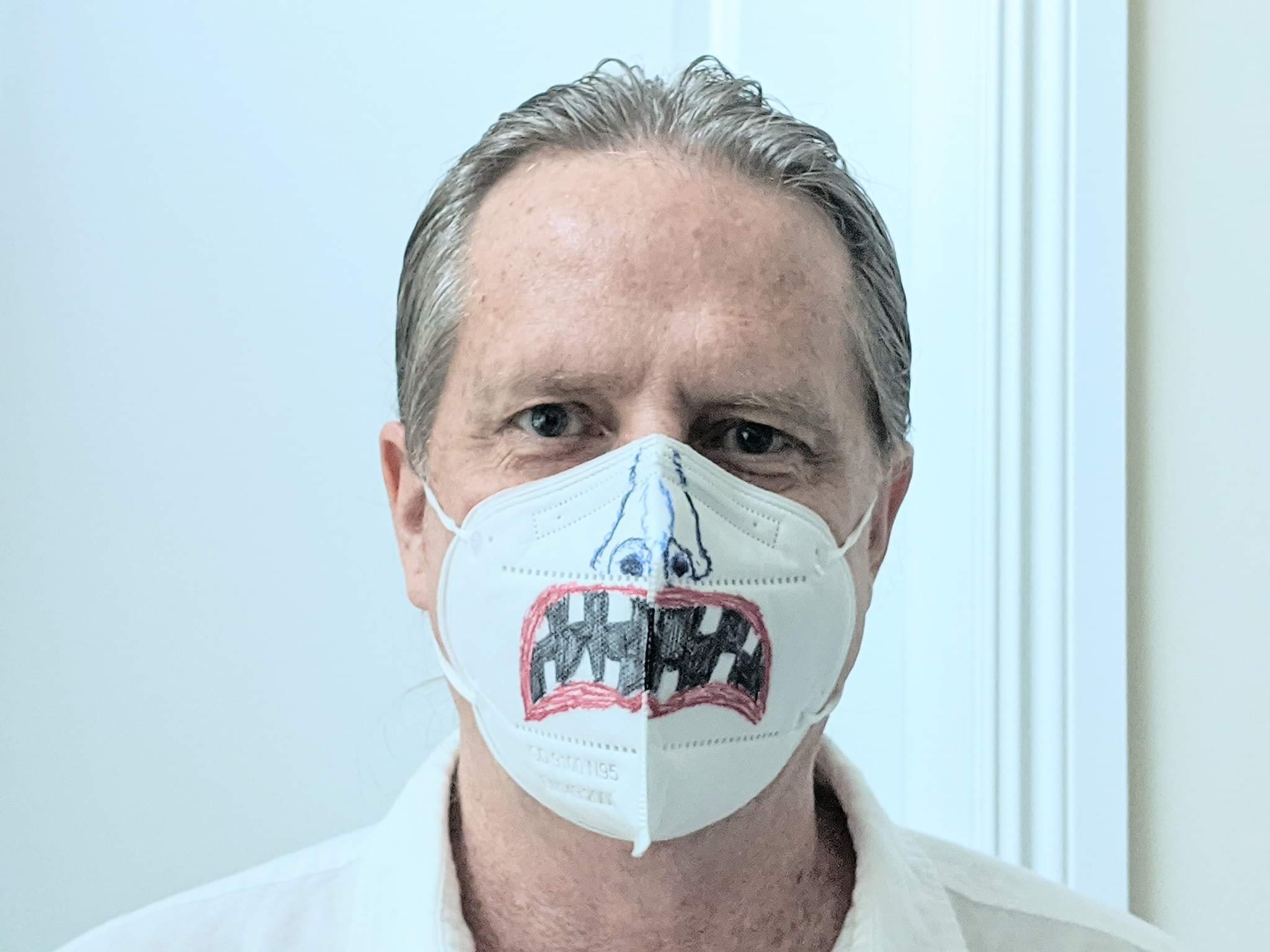
In March, I packed up my dorm room in Ohio and drove home to New York for remote learning. I was back in my childhood house surrounded by old friends and neighbors, and yet a normal social life was not in the cards for me or anyone else. When I wasn’t “in class,” I spent hours drowning in the endless and dreary void of social media. There was so much news to catch up on. Most of it was very bad and very much beyond my control. In the mornings, I would wake up, look out my bedroom window, smile a little and say out loud, “I get a new day today!” I was trying that out as an exercise in gratitude. On the advice of my therapist, I was even planning out my days in half-hour increments, hoping that a rigid schedule would give me a sense of purpose. None of it really worked.
One day, while I was listening to TED Radio Hour and staring at my bedroom ceiling, I heard Emmy award-winning writer Suleika Jaouad speak about a project she started called the Isolation Journals. She said that upon signing up for free, anyone around the world could receive daily writing prompts from inspiring public figures. I signed up immediately. Thirty days of prompts sent to my inbox every morning sounded like the perfect way to find structure and meaning in the company of my greatest loves: a pen and paper.
The Isolation Journals started as 30-day days of daily prompts to bring sanity and connection to those who needed it, but the pandemic did not go away like we’d all hoped it would. So, Jaouad extended the project to 100 days. About a month into signing up for the project, I joined the Isolation Journals Facebook group. I was hooked. Again and again, I found myself coming back to the group to see what people had posted. I liked it because it was a space hidden from the usual chaos of social media where I could muse over an image or a piece of writing. More than that, I was fascinated by the strangers who were willing to share their writing and art with thousands of others. On each post, members from all over the world commented words of encouragement and solidarity as if sending a message to a dear friend. People got deep, fast, showcasing their darkest memories and proudest accomplishments to a group of strangers. It takes a certain fearlessness to be so vulnerable, I thought, and a strength of imagination to be creative in a time like this.
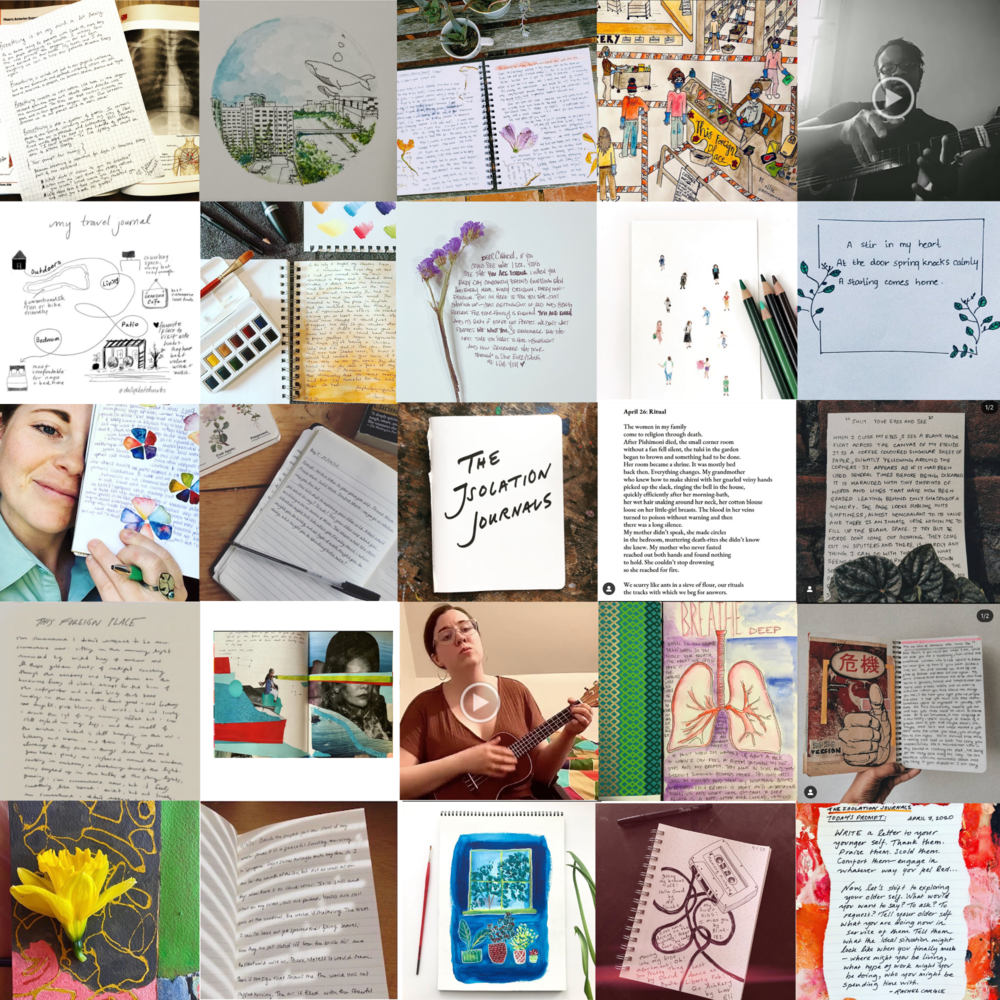
In the Facebook group of over 7,000 people, one frequent poster named Flynn stood out. His writing was rhythmic and musical, but certainly not lacking depth. His words danced on the screen; they seemed to keep him great company. One prompt asked us to complete the sentence, “if you really knew me…”. His response: “Well, I suppose if you've been reading.... You've probably already gotten a pretty big slice of the simply complicated, warm, five-berry pie that is myself*. I'm still learning. I want to be a better person. I have no enemies. I'm flawed. I forgive. If I were to be famous for anything, I'd prefer it to be because I was the most anonymous person on Earth (think about that for a second). I love music. I want you all--everyone--to have in your lives peace, love, and balance, forever. I count sheep. I have listened to an onion talking. What more is there to know? *I'm even more deliciouser with fresh, home-made whipped cream. (but don't tell no one. it's a secret).”
I decided to speak to him via Zoom.
Flynn is a 58-year-old musician with a greying beard, kind eyes and a New York accent. At surface level, he appears totally calm and composed, even ordinary. “Flynn” is a mononym. He took it on as a stage name years ago, and he changed it to his legal name in January of 2016. Flynn wakes up in his Florida home and dedicates his mornings to coffee—and not just drinking it. He makes art out of coffee sediment in his kitchen sink, and this brings him a great sense of peace.
For most of his life, Flynn has moved back and forth between New York and New Jersey, but for the past 16 years, he’s been living in Florida. He has loved to draw, write and make music for as long as he can remember, playing double bass in the school orchestras, but he also played sports. It wasn’t until later in high school that he started to take guitar lessons and focus more on music.
“I think when I was about 21 years old,” he reflects, “I realized that it would be very difficult for me with my skillset to make a living playing music. You know, it was just gonna be a struggle for me.” He decided to start a career on Wall Street. When he first arrived, he knew very little about Wall Street or what it even was. He got a job at the New York Stock exchange seven years later, where he worked on the trading floor for about nine years before getting “completely burnt out on that.”
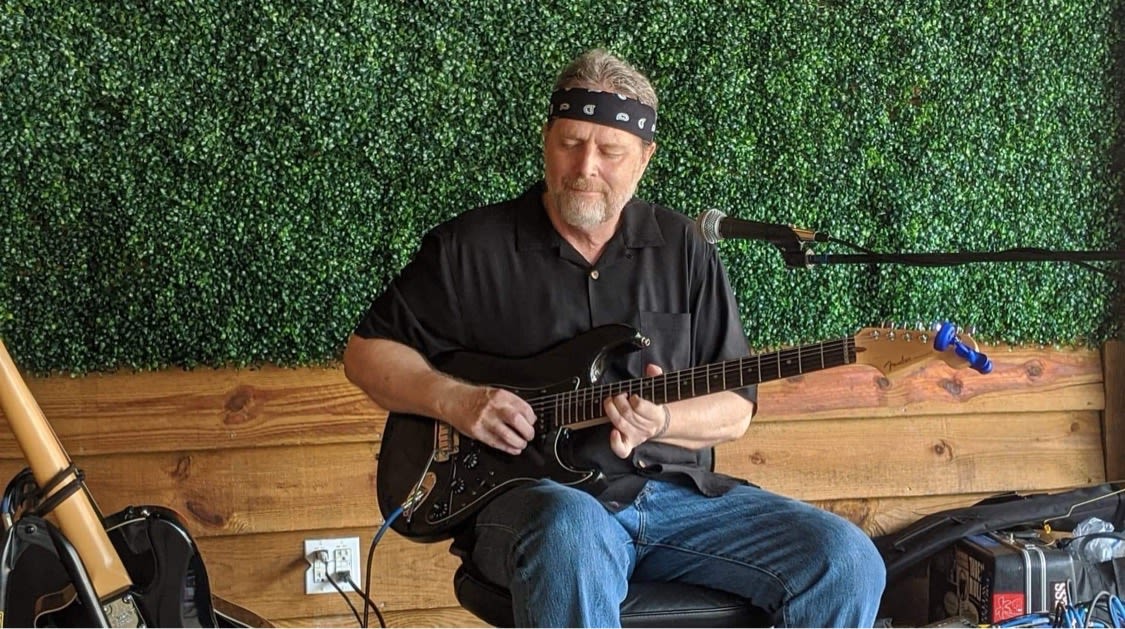
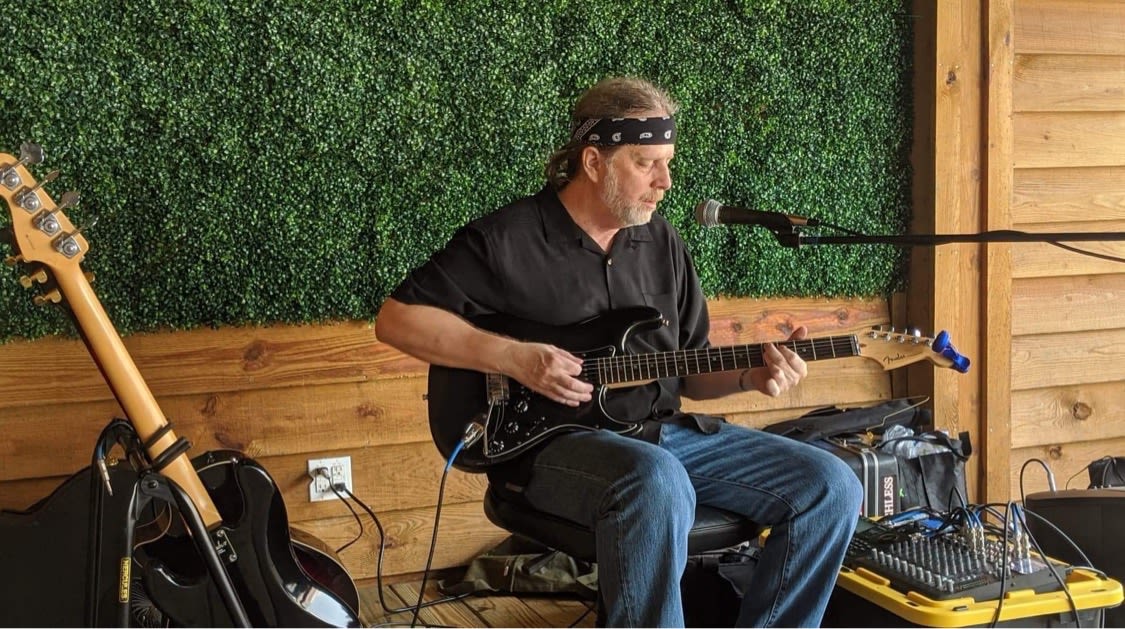
After Wall Street, he went on to be a sales associate in real estate, then he moved to Florida in 2004. Throughout all of that, he was always playing music. “My earliest memory in life is that I was musical,” he says. Now, he describes himself as a professional singer and guitarist. He enjoys performing live, mostly featuring cover songs that he thinks people will enjoy on a night out, or songs “that people might like to listen to while they drink beer.” He has a home studio where he creates instrumental music by layering drum and guitar parts using a loop station.
From the time he was young, Flynn also liked to draw and write. He has always seen art in unusual places, “not unlike how someone may see the shape of a dog in the clouds, or an interesting shadow on the wall.” He recently sent me a picture of a face he made with a banana as the mouth, a guitar pick as the nose, and earplugs for the eyes and ears. Though he never really considered himself a visual artist, he loves to look at and learn about others’ art. It would suit him, he thinks, to pitch a tent in front of New York City’s art museums so he could get up in the morning and just look at art.
In fact, Flynn had planned a trip to visit the Louvre in France, but he had to cancel it once the pandemic hit. Other than that and a few canceled gigs, his daily circumstances haven’t changed much because he hasn’t had a 9-to-5 job since he moved to Florida. In that way, he feels lucky, even if he is disappointed that he can’t bring people together with music right now. With more time in the house, he’s been leaning into writing and the visual arts. Flynn found out about the Isolation Journals in a text from his friend. He submitted his first prompt response through email, but he felt that he was just sending it off “into the dark.” So, he joined the Facebook group and started posting there.
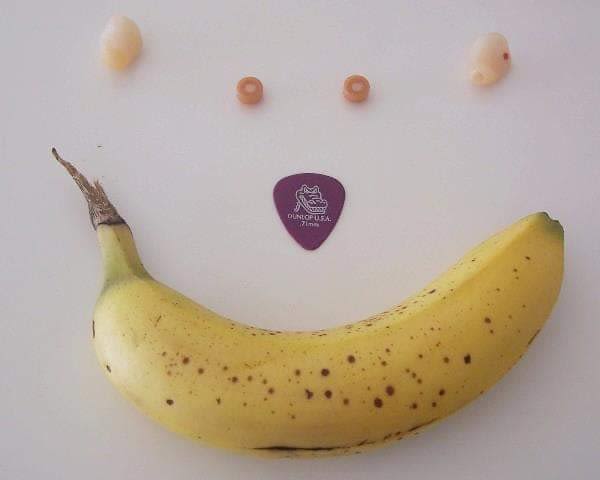
A few years ago, Flynn accidentally spilled some coffee into a porcelain sink, and a face appeared.
“It looked like two eyes,” he laughs. “It looked like a teardrop… you know, the coffee separated from the sediment, and it looked like a crying eye with a big mouth. The drain was the mouth.” When he noticed the face, he started to draw in the coffee sediment. Then he moved into a new house with a new kitchen sink. One day, he poured his coffee into the sink and forgot about it.
When he came back, he noticed that the sediment had formed a powder that adhered to the stainless steel. “So I just drew a line, I took a toothpick or a fork or something and I drew a line in it.”
That was the start of a whole new art medium. Flynn began copying pictures of silhouettes from the internet and then creating original drawings out of the sediment. Eventually, he started making abstract coffee art by taking photographs of the sediment from different angles, with different shades of light, and applying a filter. A particular filter that he loves is one that creates a colorful mosaic effect. He’s continuing to push himself creatively with the coffee art, which he dubs “SinkCoffiti,” by using foods (such as scrambled eggs, heavy cream and various spices) and even toothpaste in his creations.
Flynn is grateful for the “happy accident” that led him to discover SinkCoffiti. “Doing the sink art has been just a great sense of peace for me. Relaxing. Makes everything else go away.”
Flynn can make a picture out of just about anything, not just coffee and food. The post that made me want to know more about him was his response to the prompt, “Set a timer for one minute and make a list of all the things that help you feel creatively unlocked—the sources you reach for, the tools you need, the objects that inspire you, the workspace and routines that feel generative.” In it, Flynn wrote about how he could create out of practically nothing, and he compared his creativity to a rollercoaster inside his brain. “Wheeeeeeeeee!!!!! I let go of the bar and wave my hands in the air like I just don't care! Wheeeeeee!!!!”
Along with this written response, he attached 41 photos of his art. Among these were a picture of his face wearing a mask on which he had drawn a gnarly mouth full of crooked teeth and a skeletal nose, another face made out of spaghetti and meatballs, more faces of the sort, a water leak in the shape of a dinosaur with guitar picks for eyes and teeth, and a question mark in coffee foam.
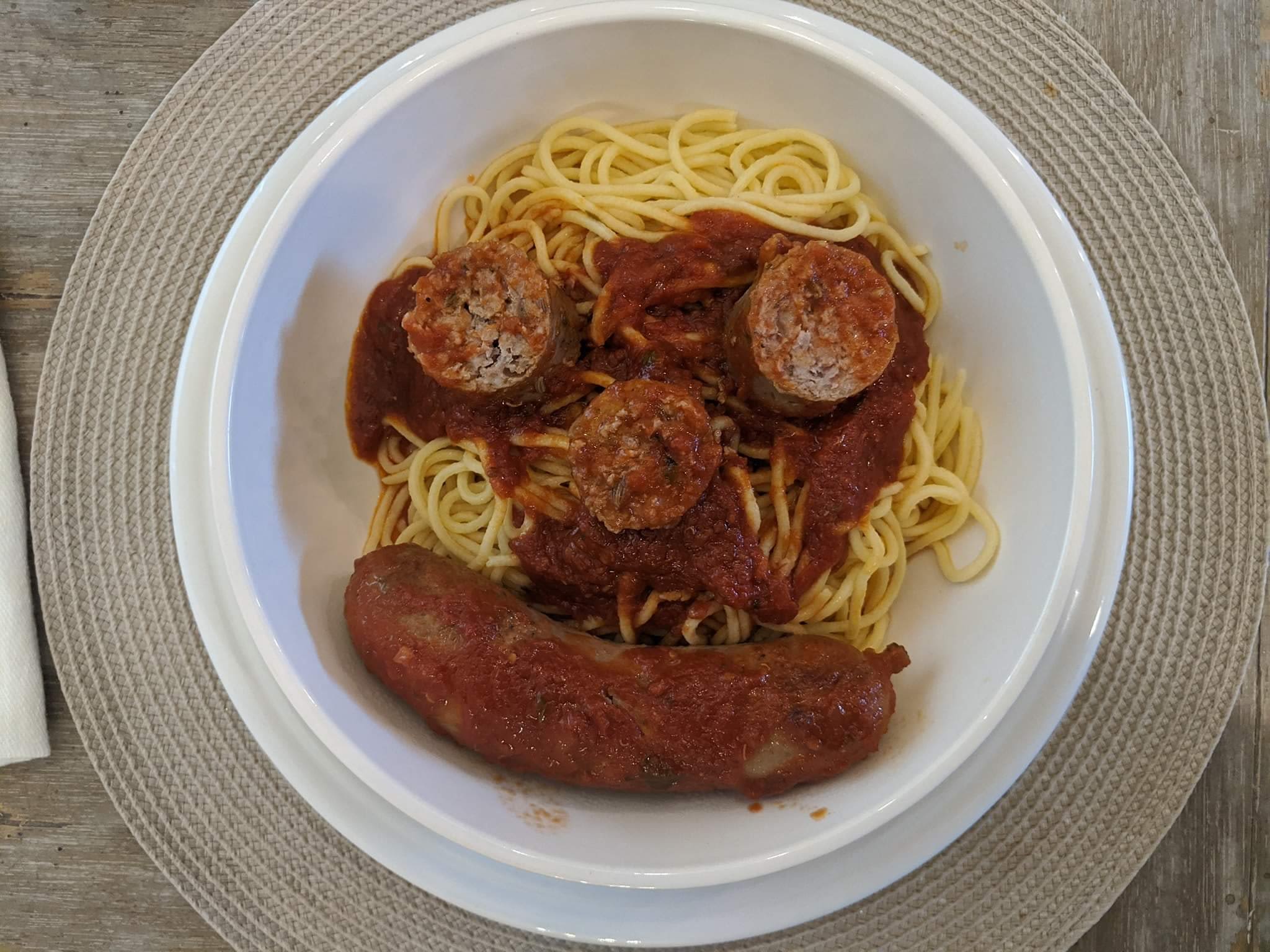
“I push things like a shopping cart with a broken front wheel, and I can push it, but it’s still gonna go wherever it wants to go anyway.”
There is a Japanese philosophy called “wabi sabi.” The idea of wabi sabi is rooted in Taoism and Zen Buddhism; “It finds beauty and harmony in what is simple, imperfect, natural, modest, and mysterious.” Flynn was the embodiment of wabi sabi. I wanted to be more like him.
Flynn has one analogy for his creative process that he reminds me of often: “I push things like a shopping cart with a broken front wheel, and I can push it, but it’s still gonna go wherever it wants to go anyway.” Similar to his sentiments about creativity, beauty is something that comes naturally to him. It does not take labor to attain, nor is it to be “searched” for, because it’s already there. One day, Flynn wrote about beauty on the Facebook page. “It’s over there (*points over there*) and over there, (*points over there*). ‘Look’ for it? Yes. ‘Search?’ Don’t gotta.” He attached 21 photos of the sky in all of its phases, including numerous sunrises and sunsets, with color schemes from fiery reds and oranges to cotton candy pinks and blues.
Both Flynn’s writing and his SinkCoffiti were praised by Isolation Journals group members. Comments like “what a treasure!,” “giggle,” and “you made me LOL on a dull day” were common. He reached writers far and wide. One member, a homeless woman from Trinidad, was charmed by his posts. With Flynn’s permission, she used one of his pieces as her profile picture; an image of an angel made out of coffee sediment with a mosaic filter.
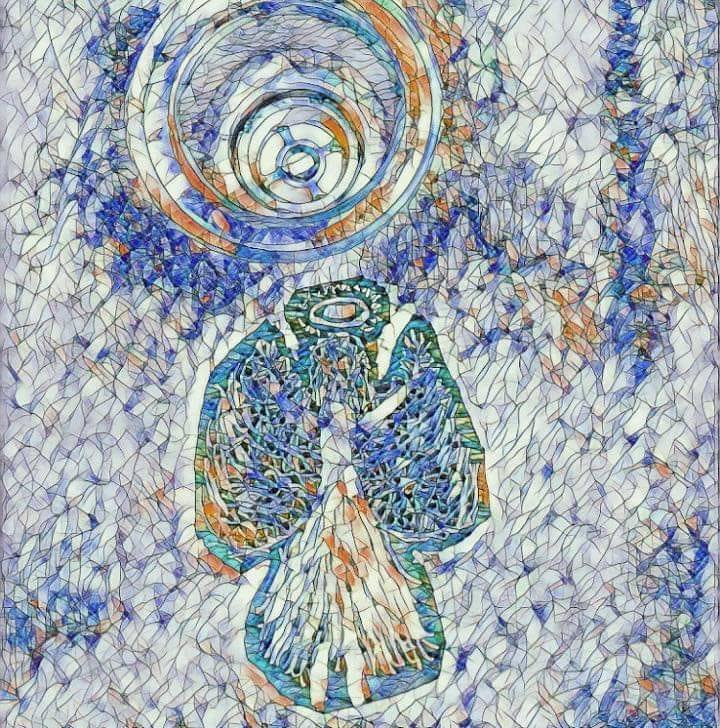
There are angels to be found in a cup of coffee.
Flynn received so much positive feedback that he was overwhelmed. “I was really touched by a lot of the things that people said,” he shares. He acknowledges that there were more positive comments than suggestions for edits, but in this context, he didn’t mind a bit. Rather than a forum for constructive criticism, Flynn appreciated the group as a place to connect. He gave back the attention he received by leaving thoughtful comments on others’ posts.
Flynn updated the group one day letting everyone know that in part because of their encouragement, he had gotten his very first SinkCoffiti piece printed and framed, and had hung it up on his wall. “I’m so very, very, grateful."
After 100 days of daily prompts, the Isolation Journals has transitioned to sending them out on a weekly basis. Flynn still responds to them in a fashion that is true to who he is, including lots of analogies, jokes, and heartwarming anecdotes. When the pandemic is over, he plans on having a glass of champagne. Then he will travel, write, make art and music.
Flynn reminded me of one simple fact: we may be in the apocalypse, but the world has not gone grey. There are colors everywhere, there are textures always. There are angels to be found in a cup of coffee. Even in a corner of the (mostly) lonely and negative world of social media, there is the potential for connection.
Summer comes to a close while the pandemic keeps on keeping on. I look at things differently than I did at the beginning of my time at home. Every night I sleep under a quilt that my grandmother made me, and yet I’ve never paid so much attention to the patterns and colors that make it whole. I look for shapes in the clouds. I hate waking up early, but I did it, just once, to watch the sunrise.
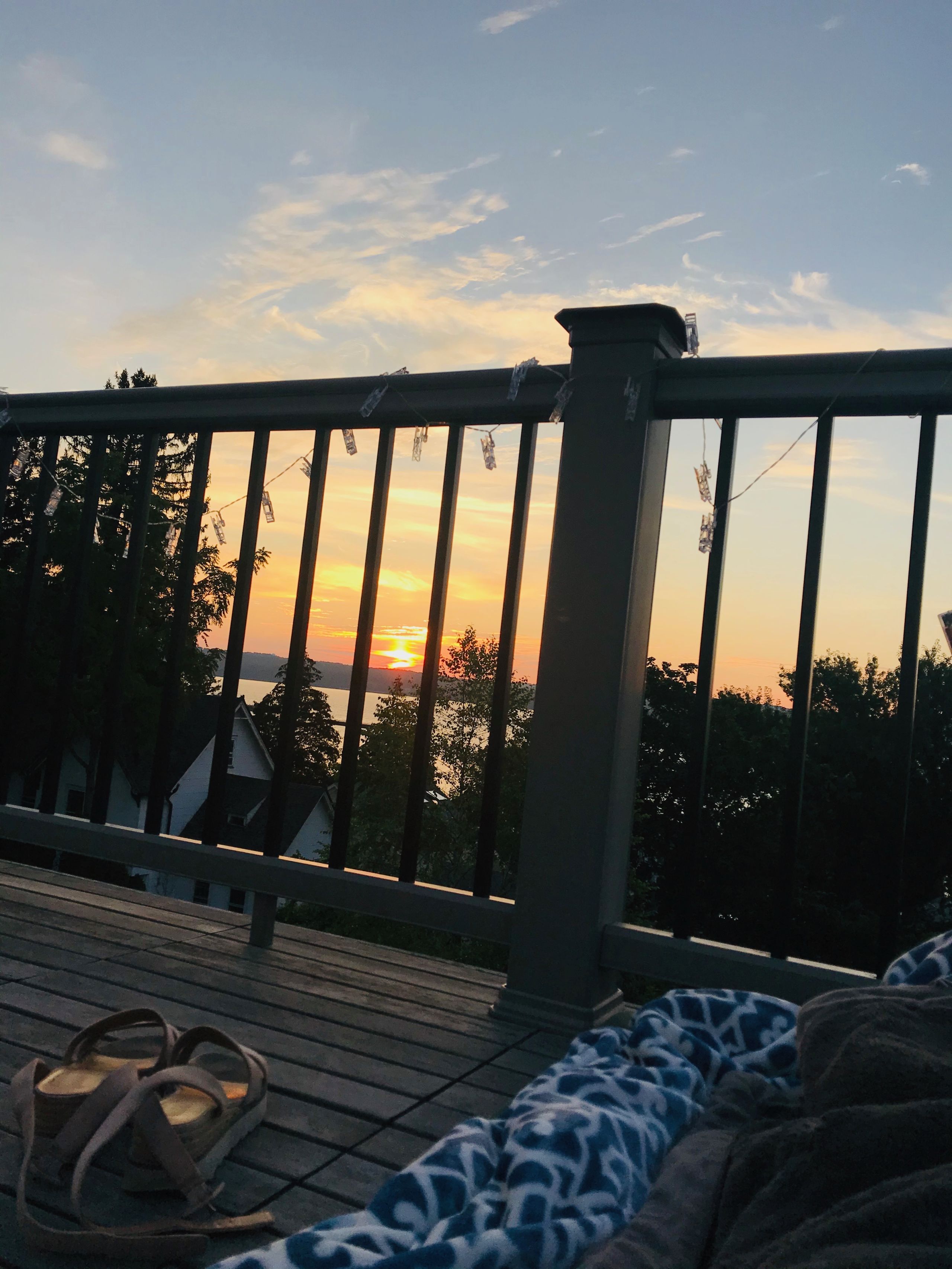
Art and other photographs provided by Flynn
Flynn's instagram is @sinkCoffiti You can find his Facebook page at Facebook.com/SinkCoffiti
